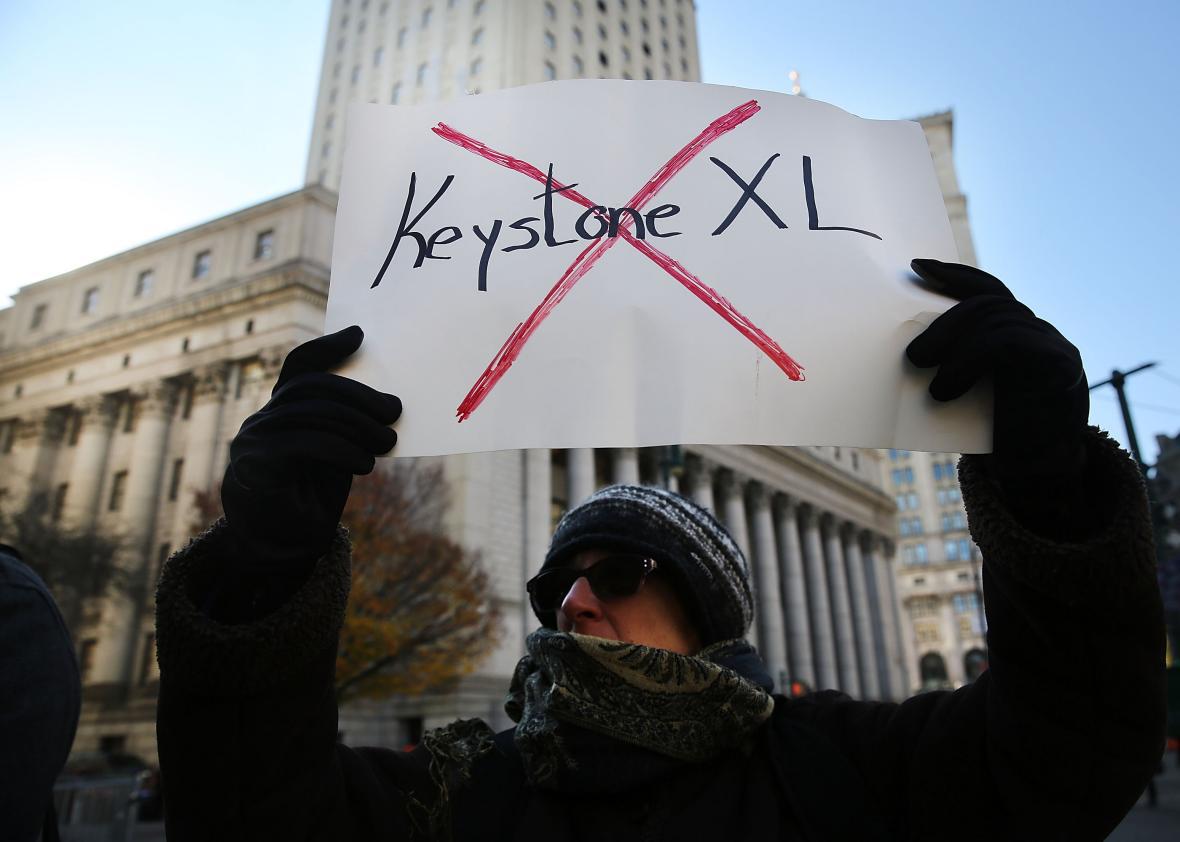On Friday, the Obama administration finally rejected the Keystone XL pipeline that would have transported crude oil from the Canadian tar sands to the Gulf Coast. Predictably, environmentalists are doing a victory lap.
Only problem is: Keystone has been a mostly irrelevant distraction for years. While politicians and activists deadlocked on the pipeline project, economic ingenuity rendered the debate moot. As my Slate colleague Josh Voorhees notes, Obama admitted as much in his announcement: “For years, the Keystone pipeline has occupied an overinflated role in our political discourse.”
Oil companies are smart, and over the seven years the pipeline has been pending, they’ve put in place an effective mix of workarounds including oil trains, other pipelines, and a vastly different U.S. energy mix, including a substantial rise in domestic production of oil, gas, and renewables. Meanwhile, the Obama administration has made a concerted, albeit piecemeal, effort to reduce fossil fuel demand across the economy. Those trends have contributed to a sharp drop in oil prices over the last year or two.
And now, Keystone is officially dead. Basically, environmentalists should thank the ghost of John Muir and his magnificent beard that we don’t have to talk about it anymore. That’s today’s biggest victory.
Thankfully, attention is already shifting to the next big climate fight: shutting down fossil fuel production on public lands. Earlier this year, an entire new genre of activism—kayaktivism—was born in the Pacific Northwest as hundreds of brightly colored boats attempted to block Arctic-bound oil exploration vessels. Though activist attention on this issue has focused on the Arctic so far, they’re already widening their reach to the entire nation.
Here’s why that fight is so important: U.S. public lands—that’s land that you and I own, remember—are responsible for hundreds of times more carbon dioxide emissions each year than would have traveled through Keystone. Recent estimates showed the Keystone XL would have been potentially responsible for tens of millions of tons of CO2 each year—but fossil fuel extraction on public lands already produces more than 1 billion tons annually and holds the potential for an unfathomable hundreds of billions more. The difference in importance is barely even comparable—halting future public lands production would truly be a game changer.
In his Friday announcement, Obama essentially endorsed this fight, saying: “Ultimately, if we’re going to prevent large parts of this Earth from becoming not only inhospitable but uninhabitable in our lifetimes, we’re going to have to keep some fossil fuels in the ground rather than burn them.” The science on this issue backs him up.
This is a pretty substantial change in tack from the president. He repeatedly campaigned on an “all-of-the-above” energy strategy that helped encourage the ongoing American oil and gas boom, while at the same time advocating for tough action on climate change. In May, the Obama administration quietly approved vast new coal leases in Wyoming’s Powder River Basin that would dwarf the combined impact of all his other actions on climate change. As recently as his high-profile climate-focused trip to Alaska two months ago, the president was fending off criticism of his support for drilling for oil in the Alaskan Arctic. This is a little bit like having your cake and eating it too, and activists have repeatedly called him out on it.
In recent weeks, though, it seems like the president is finally starting to get it. Shortly after Shell abandoned its Arctic endeavor in September after failing to find oil in meaningful amounts, the Obama administration canceled future drilling lease sales there—an important signal.
Still, it seems Obama is mostly playing catch-up to the leading Democratic presidential candidates: Hillary Clinton’s public statements on the Arctic probably helped focus activist ire on the president, and just this week, Bernie Sanders co-sponsored a bill in the U.S. Senate that would ban all new fossil fuel leases on public lands.
Obama’s Keystone rejection isn’t even this week’s biggest climate story. On Wednesday, New York state launched an investigation into whether ExxonMobil intentionally misled the public on the climate risks of fossil fuels starting as early as the 1970s. It’s already drawing comparisons to the tobacco industry’s decision to ignore the fact that its product caused cancer. Taken together with Friday’s Keystone decision, Bloomberg notes, this trend “doesn’t end well for oil.”
By taking on both public and private fossil fuel production on a much larger scale than Keystone, activists can push Obama to become a true leader on climate change—and in the process change the tide of public opinion on the issue, much in the same way that smoking is now at an all-time low.
